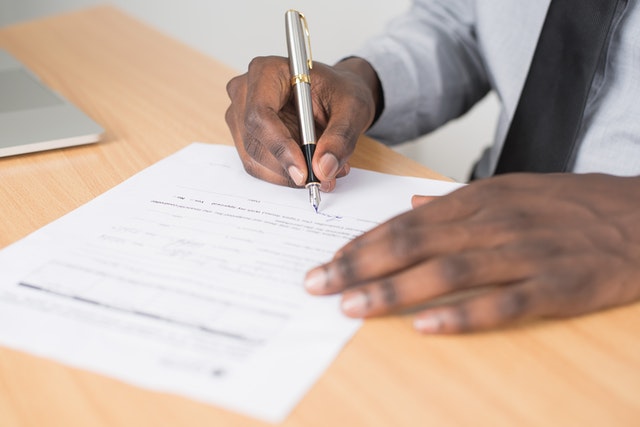Over time, you build equity in your house, which allows you to apply for a home equity loan or home equity line of credit (HELOC).
Whether you will pay for renovations, student loans, or something completely different, an equity loan is a great way for you to have access to money, without having to drain your savings account.
In this article, we'll explore all the nitty-gritty that goes into the process, from its length to what the process entails.

We've included an outline of the process for anyone wondering however, again, for the specific details it is best to consult your lender directly.

Unfortunately, there is no single answer to this question if you ask various lenders, you're likely to get a different answer. The truth is that home loan equity approval can take anywhere from a week to up to two months in some cases.
The average time, however, tends to be anywhere from two to six weeks, with most closings done within a month.
As mentioned already, each process is individual and therefore you need to keep in mind its flexibility. The actual length will rely on many factors, such as your home valuation and the underwriting process.
Therefore, it is best to ask your lender directly, as they will have the most accurate information.
As mentioned above, there are several factors that can either speed up or slow down your home equity loan application process.
It is not a rare occurrence that closing dates get pushed back in order to allow for extra time to review more documents, finish the appraisal step, or even the underwriting process.
As such, you have to have patience and keep in mind, that some factors may simply be out of your control.
Here are the most common factors adding extra time to the home equity loan process and tips on how to avoid them:
If you buy a house with a mortgage, the lender will look at your credit history and use your score in a particular range to determine whether you can get a loan or not.
If your score falls below a specific point, the lender will deny your application. The credit score that most lenders use is the FICO score, which ranges from 300 to 850.
Do you need good credit for buying a house? The short answer is yes and no. But we will get more into this because that is not a good answer, is it?
A score above 780 is considered good. However, you do not have to have excellent credit to buy a home. In fact, many people with good credit scores still get turned down for a loan.
That's because your credit history and score are only part of the equation.
Other factors can also influence whether you are approved for a mortgage. Your income and the amount you want to borrow are two crucial factors.
If you do not earn enough or want to borrow too much, you might get denied no matter how good your credit is.
These are all factors that can affect your approval:
If you are declined for a loan, there might be things you can do to improve your score and get approved. For example, if your debt-to-income ratio is too high, you might consider paying off some of your debt.
If your credit score is in the mid-500s, you might have options at alternative lenders.
If you have a low credit score, it's best to start by making sure there aren't any errors on your credit report. If there aren't any errors, you can focus on paying off debt and building credit.
Here is an overview of our list "Do you need Good Credit for buying a house"
As you see we are going to cover many different aspects of our list "Do you need Good Credit for buying a house".
First on our list "Do you need Good Credit for buying a house" is the all to common bad credit

If you have bad credit, you might have a hard time getting approved for any type of loan. You most likely need to pay a higher interest rate, which will make it more expensive to buy a house. If you are able to buy a house, you will probably need a cosigner.
A cosigner is someone who agrees to be responsible for your loan if you default. Your cosigner's credit history will be taken into account when lenders decide whether to give you a loan.
If you can buy a house with bad credit, the lender might also give you a shorter loan term.
That way, if you have trouble making your payments, you will not be stuck with a mortgage for 30 years.
If you have bad credit, there are a few things you can do to improve your credit score. First, make sure you are paying all of your bills on time.
If you have a credit card, try to pay it off in full every month. You can also try to get a secured credit card.
With a secured card, you deposit money with the credit card company. That money is used as collateral for your credit card. It will help you build a credit history, and you will be able to use the credit card to make purchases.
Second on our list "Do you need Good Credit for buying a house"is what do you do if you have no credit?

You are able to buy a house with no credit score. There are two ways to do this. One option is to buy a house in cash. The other is to buy a house with the seller financing the purchase of the home.
That means is that the seller will give you the money for the down payment and will have you pay him instead of a bank. Alternatively, you can look if you qualify for any of these:
A VA loan is a mortgage loan that is guaranteed by the Department of Veterans Affairs. It is a great way for veterans to buy a home. The VA loan has a low down payment and a great interest rate. It is a great way to buy a home if you qualify for the loan program.
A Federal Housing Administration (FHA) loan is a mortgage loan insured by the Federal Housing Administration. The FHA makes loans to home-buyers who meet the requirements for FHA-insured loans, which are the most lenient of the mortgage loan programs.
FHA loans require a minimum down payment of 3.5 percent as opposed to the 20 percent required by other mortgage loans.
The FHA also requires the borrower to pay mortgage insurance for the life of the loan, which protects the lender from losses in the event that the borrower defaults on the loan. The borrower pays the mortgage insurance premiums.
An FHA 203(k) loan is a mortgage that allows homeowners to finance both the home purchase and a wide range of home improvements and repairs into one mortgage loan.
The 203(k) loan is a great option for homebuyers who are looking to purchase a home that needs repairs.
The 203(k) loan is used to finance both the purchase and the repair of a home.
The loan limits for a 203(k) loan are the same as the limits for a conventional mortgage loan.
Third on our list "Do you need Good Credit for buying a house" is can you still buy a house without money down?

If you have no money, you might be able to use a cosigner. It's possible to buy a house with no money down. If you want to buy a home with a mortgage, you can pay for your down payment with a gift from family members or a gift from a charitable organization.
It's also possible to buy a house with no money down if you buy the property using a land contract. In a land contract, the seller gives you the deed to the property after an initial payment.
You then make monthly payments until the balance is paid off. The seller retains ownership of the property until the end of the contract. A land contract can be also called a contract for deed.
If you have no money for a down payment, you might be able to find a seller who is willing to use a land contract. The seller will probably require you to pay a higher interest rate, and the monthly payments will likely be higher than those you would have to make with a traditional mortgage.
Fourth on our list "Do you need Good Credit for buying a house" is what if you have no money?

You can buy a house without money at all if your family or friends help you to pay for your down payment. However, if you don't have any money you should probably not think about buying a home in the first place.
Last on our list is "Do you need Good Credit for buying a house" can you use a credit card to buy a house?

You cannot buy a house with a normal credit card. You might be able to use a credit card to make a down payment on a house. For example, if you put $10,000 on a credit card, you might qualify for a loan with a $100,000 balance.
You could use a credit card for a down payment if it has a low-interest rate and you pay off your balance in full every month.
Normally you should never use a credit card to make a down payment. If you do, you'll be charged interest if you are not able to pay off the balance at the end of the month.
We have hoped you like our article "Do you need Good Credit for buying a house". This article was made for educational purposes only and you should consult a professional if you need to know more.
Is there something else you would like to add to our list "Do you need Good Credit for buying a house"?
A fast answer to the question, "Do you need Good Credit for buying a house" is it is easier if you do. Then you will not have to take a riskier alternative approach.
If you are in the market for buying a house then check out our tips on making an offer on a house!
Many people find themselves with unwanted property when a relative passes away.
While some people are willing to take on the responsibility of caring for a relative's home, others are not. In some cases, the cost of maintaining the house is way too high, or the home is too far away for any inheritor to take care of it.
Inheriting a property can be a great blessing or a terrible burden. It is essential to understand your options before you will make any decisions.
Here are some important things to consider before thinking about inheriting a house.
These are the things that can go wrong on our list of "What Can Go Wrong When Inheriting a House?"
First, on our list "What Can Go Wrong When Inheriting a House?" is the problems of wills.

If a person dies without a will, the state distributes his property according to the rules of “intestacy". These rules focus on the deceased's blood relatives, who inherit the property. If your relative died without a will, you might have to go through the intestacy process.
However, if the deceased had a will, you will have to go through the probate process to transfer the property to you.
If the deceased's will had flaws, you might have to go through an extended probate process. This can cause delays and problems with the property.
Also, if a relative dies in litigation, you may have to wait until the case is over before you can sell the property.
Second, on our list "What Can Go Wrong When Inheriting a House?" is where the house is located.

If you inherit real estate in another state, you need to make sure to hire a lawyer to help you manage the process of transferring the property.
If the deceased-owned property is in another state, you will likely have to deal with the state's probate system in order to transfer the property.
And in general, if you inherit a house far from home, you probably would want to sell it.
Alternatively, you may have to move to be closer to the house and its upkeep or hire a property managing company to take care of everything.
Third, on our list "What Can Go Wrong When Inheriting a House?" is the most common problem, the good ole family disputes!

First, on our list "What Can Go Wrong When Inheriting a House?" is the problems of wills.
Inheritance often ends in a lot of family disputes, that's why it is important to find a way to benefit most family members. If someone on the inheritance list is in financial trouble, you might want to choose to sell the property to help them out.
Every family member is entitled to a certain amount of money from the sale of the property.
If there is a big dispute over the property, and one party wants to sell and one wants to keep it, you may never be able to sell it. So, the best idea is to try to compromise with everyone.
If you want to sell the property, you should know that you have some obligations to the heirs. You have to be honest with them and give them all the information possible. You have to tell them what the property is worth, how much the taxes are, and what the property needs to be fixed.
If you don't tell them, they might be able to take you to court.
Fourth, on our list "What Can Go Wrong When Inheriting a House?" is the possibility of having to deal with an unwanted tenant, a house torn up by an unruly dog, or the walls stained with cigarette smoke.

Sometimes, the deceased may have allowed a tenant to live in a house he owned. If you inherit this property, you may have to pay the tenant to move if eviction is not an option just to be able to sell the house.
If the deceased were a pet lover, you might have to take on the responsibility of caring for the pets. You can sell the pets or keep them in your house.
If the deceased were a smoker, his or her home might still be filled with cigarette smell. Its smell might not be pleasant to live in for non-smokers.
This is why you may want to consider hiring professional cleaners to help you remove the smell of cigarette smoke from the deceased's home.
Fifth, on our list "What Can Go Wrong When Inheriting a House?" is the problems of safety.

If you inherit a house, you will have to ensure that it is safe to live in. If it doesn't meet safety standards, you may have to sell it. Or, you may have to hire a contractor to fix the problems.
The roof may be shot and the ceilings are caving in!
Sixth, on our list "What Can Go Wrong When Inheriting a House?" is your current financial situation.
If you inherit property, but your finances are in trouble, you may have to sell the property without any choice. Especially if the deceased took out a mortgage on the property, which you would have to pay off before fully owning the property.
It is crucial to consider the financial impact of inheriting property before you take it over. If you are in the middle of a personal financial crisis, while it can be tempting, you need to sell the house or some of its contents and use the proceeds to pay off your debts.
If you want to eliminate the high fees and closing costs you can contact a cash home buyer like Veritas Home Buyers.
Seventh, on our list "What Can Go Wrong When Inheriting a House?" is your time situation.

If you inherit property, but you have no time to manage it, you might want to sell it. It is important to consider the time you have to manage the property and the cost of hiring a property manager.
Eighth, on our list "What Can Go Wrong When Inheriting a House?" is the possibility of dealing with co-ownership.
If your relative owned a house with a family member, you will have to wait until the probate process is over before you can sell the property.
However, if the property is in a trust or the deceased left a will, you can sell the property without going through the probate process.
Last, on our list "What Can Go Wrong When Inheriting a House?" is your life situation.
If you inherit a house, there is a chance you have to move into it yourself. This may disrupt your plans to move to another city.
If you have already started a new life, you may not want to move to a new house. Instead, you may choose to sell the property.
You may need to give up your job in order to take care of the house. So, if you're not in the middle of a career change, this is probably something you don't want to do.
You might have to move to the house with your spouse in order to keep it. If you do not want to stay with your spouse, you may have to sell the house in order to move away.
And if you happen to be in the middle of a divorce, you should probably sell the house in order to pay for legal fees.
In case you already own property, you might not want to take on the responsibility of managing another home. Choosing to sell the inherited property and investing elsewhere might be smart.
So when you are asking yourself, what can go wrong when inheriting a house? Know that there are many things to plan for and take into consideration.
We hoped you enjoyed our article "What can go wrong with inheriting a house" and that you have learned something from it.
If you have inherited a house then you will want to become familiar with the term Executor. (Also, see how long an executor has to sell a house.)